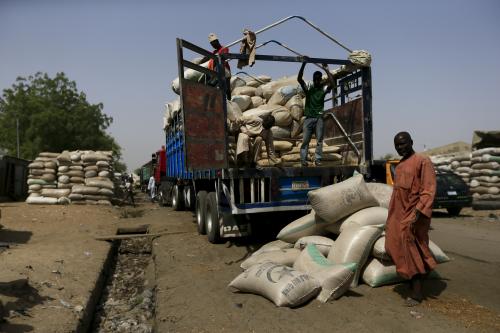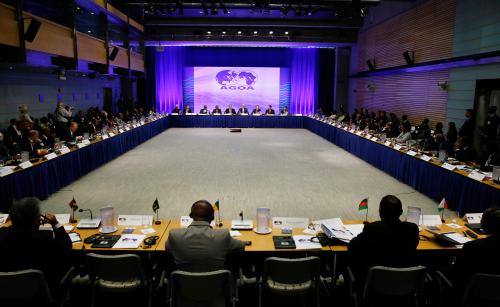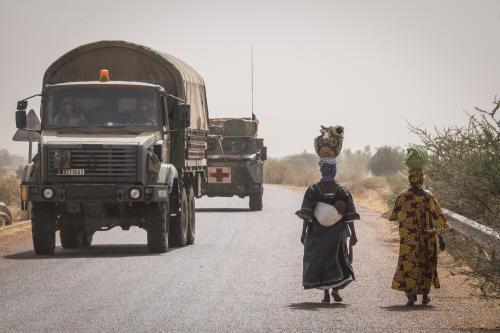U.S.-South Africa trade row raises questions for AGOA extension
The export of poultry from the United States to South Africa is at the center of an escalating trade dispute between the two countries. Since 2000, South Africa has benefited from duty-free access to the U.S. market for nearly 95 percent of its U.S.-bound exports through the African Growth and Opportunity Act (AGOA)—a piece of U.S. legislation that aims to increase and facilitate trade between the U.S. and sub-Saharan Africa. Meanwhile, since 2000, South Africa has placed strict tariffs on American chickens in order to protect its own chicken industry from rising food production costs attributed to a weakening currency, rising labor costs, and frequent power cuts. While U.S. officials have defined these tariffs as a trade violation, South African officials have conversely accused the U.S. of “dumping” or selling the chicken below the cost of production in South Africa. As AGOA is set to expire on September 30, 2015, the poultry dispute is complicating the legislation’s renewal process and raising questions about the future place of South Africa within the trade agreement.
Senator Johnny Isakson (R-Ga.) alongside Senator Chris Coons (D-Del.) represent the United States’ largest chicken-producing states. In the last few months, they addressed a letter to South African President Jacob Zuma urging him to guarantee market access for U.S. poultry. In the event that access is not granted, the senators threaten to exclude South Africa from the renewal of the trade agreement, although such a move would have severe consequences for both parties. AGOA has benefitted both countries considerably: Under AGOA, South Africa has exported significant quantities of manufactured goods to the U.S., notably 60,000 cars per year, and, in fact, 75 percent of non-oil imports from Africa to the U.S. come from South Africa.
16th East African Community (EAC) summit seeks to improve regional integration efforts
Today, February 20, leaders of the five countries that comprise the East African Community—Burundi, Kenya, Rwanda, Tanzania, and Uganda—will meet in Nairobi for the 16th Ordinary Summit of Heads of State to discuss issues surrounding regional economic integration and funding mechanisms for the bloc’s numerous activities. In the lead up to the meetings, employers and trade unions have urged the EAC to remove barriers preventing workers from moving freely throughout the region. Specifically, the East African Trade Union Confederation (EATUC) and the East African Employers Association (EAEO) have called for the full implementation of the Common Market Protocol of 2010, which aims to promote the movement of people, goods, services, and capital throughout East Africa.
On Wednesday, the EAC also received a new commitment to advance a regional power-sharing arrangement. The African Development Bank (AfDB) approved a loan of $145 million to the Kenya-Tanzania Power Interconnection Project that aims to improve the supply and reliability of electricity to the region. Furthermore, Rwanda signed a deal with Kenya for the annual export of 30 megawatts of Kenyan electricity (at a cost of $36.4 million) to the Rwandan national grid.
Regional and international support builds against Boko Haram
In recent months, the Boko Haram insurgency has spread into neighboring countries: Cameroon, Niger, and Chad. This week, fellow African nations, with assistance from the United States government, have pledged to increase efforts to assist Nigeria in the fight against Boko Haram. Presidents from the Economic Community of Central Africa States committed to increasing funds for military operations against Boko Haram at the extraordinary Summit of Council for Peace and Security in Central Africa (COPAX) in Yaoundé, Cameroon on February 16. Gabon’s President Ali Bongo announced the creation of an $86.7 million emergency fund to mobilize resources for regional military forces to counter Boko Haram. In addition, military chiefs will meet in N’Djamena, Chad next week in order to finalize the strategy for the taskforce of 8,700 military personnel troops from Chad, Cameroon, Nigeria, Benin, and Niger. The alliance between Nigeria and its neighbors against the Boko Haram insurgency has already shown potential: In recent weeks some territory occupied by Boko Haram has been reclaimed by troops from Chad.
Meanwhile, James Linder, commander of the U.S. Special Operations forces in Africa (a sub-command of AFRICOM), stated this week that the U.S. will share communication equipment and intelligence with regional forces since the lack of compatible communication equipment has been one of the key challenges in the fight against Boko Haram.
The Brookings Institution is committed to quality, independence, and impact.
We are supported by a diverse array of funders. In line with our values and policies, each Brookings publication represents the sole views of its author(s).







Commentary
Africa in the news: U.S. and South Africa argue over poultry, EAC summit highlights regional integration, and international efforts against Boko Haram redoubled
February 20, 2015